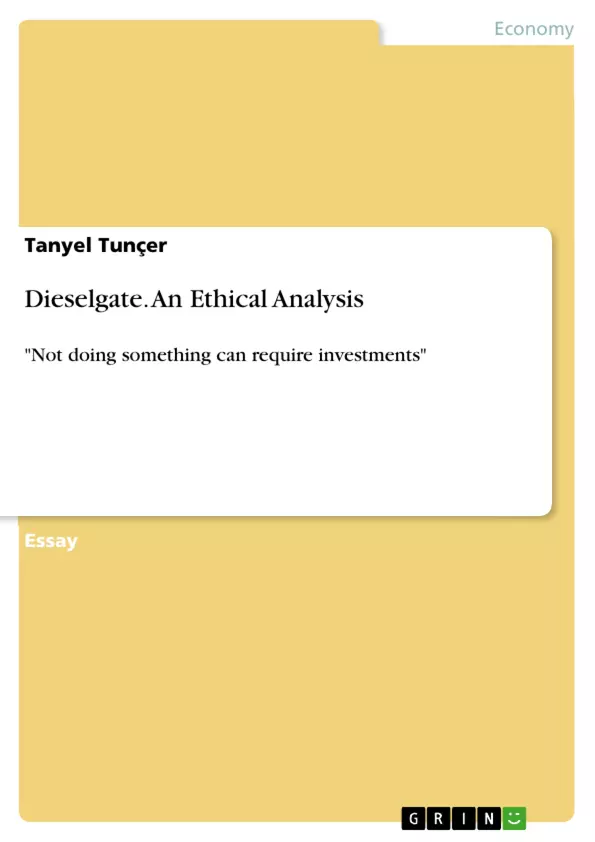Since 2015 Volkswagen Group has been officially involved in an emission fraud scandal (Dieselgate) and its repairments, which led to be one of the most costly fraud cases in the history of the automotive industry. The self-imposed Dieselgate was an expression of poor work by VW with inadequate decisionmaking by management, unethical corporate governance, and a lack of a duty of responsibility.
VW faced three allegations of misconduct. Intended air pollution, breaking the rules and cheating on emissions tests. Therefore, the Dieselgate is used to analyze and explain the assertion “Not doing something can require investments” by referring to the ethical compass (EC). The study is going stepwise to explain the meaning of the assertion by giving a rough understanding of the Dieselgate (Chapter 2), analyzing the Dieselgate with the help of the EC to answer the question whether VW postponed its investments into the future or not (Chapter 3), transferring the analysis results to the general to define the real meaning of the assertion (Chapter 4) and then giving a conclusion (Chapter 5).
Inhaltsverzeichnis (Table of Contents)
- Introduction
- Background
- Analysis
- Results
- Conclusion
Zielsetzung und Themenschwerpunkte (Objectives and Key Themes)
This essay explores the "Dieselgate" scandal involving Volkswagen Group (VW) and the implications of its actions on business ethics. The focus is on analyzing the assertion "Not doing something can require investments" through the lens of the ethical compass. The essay aims to understand VW's decision-making process and the consequences of their actions, including the impact on market share and their ethical responsibilities.
- The ethical implications of VW's actions in the Dieselgate scandal
- The role of the ethical compass in evaluating business decisions
- The relationship between corporate governance and ethical decision-making
- The impact of the Dieselgate scandal on VW's market share and reputation
- The costs of ethical negligence in the long term
Zusammenfassung der Kapitel (Chapter Summaries)
- Introduction: This chapter introduces the Dieselgate scandal and its significance in the automotive industry. It also outlines the assertion "Not doing something can require investments" and how the ethical compass will be used to analyze VW's actions.
- Background: This chapter provides context for VW's decision to manipulate emissions tests, exploring their market ambitions and the challenges they faced in the US market.
- Analysis: This chapter uses the ethical compass to examine VW's decision-making process, analyzing the ethical implications of their actions and their potential consequences.
Schlüsselwörter (Keywords)
The key concepts and themes explored in this essay include: Dieselgate scandal, ethical compass, corporate governance, decision-making, environmental responsibility, market share, reputation, Volkswagen Group (VW), United States (US), emissions testing, and ethical negligence.
- Arbeit zitieren
- Tanyel Tunçer (Autor:in), 2022, Dieselgate. An Ethical Analysis, München, GRIN Verlag, https://www.grin.com/document/1183592



